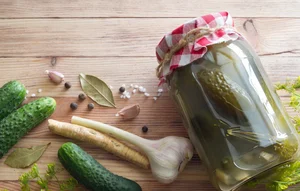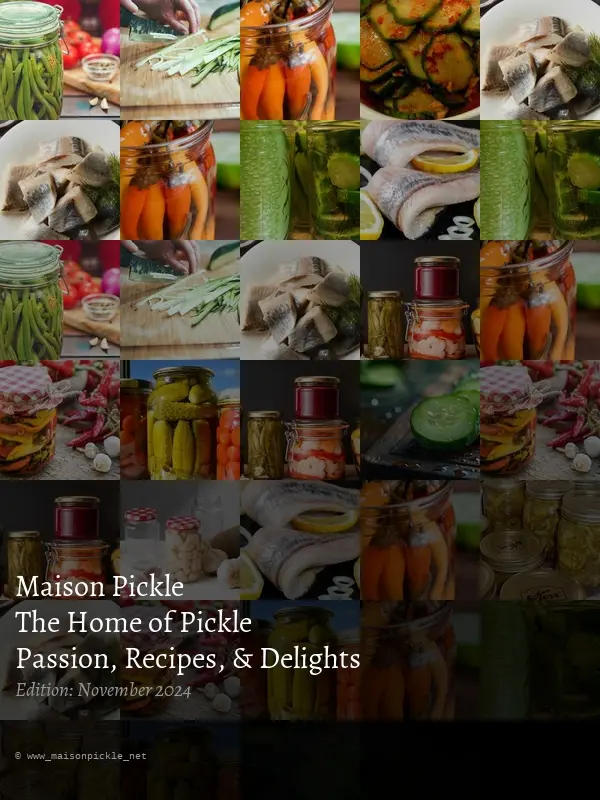Understanding Pickles
What Are Pickles?
Pickles are preserved foods, primarily vegetables, created through a process called pickling. This involves immersing vegetables in a brine solution typically containing vinegar, salt, and various spices. While cucumbers are the most commonly pickled vegetable, particularly in the United States where they are often simply called "pickles," a wide array of other foods can be pickled, including carrots, onions, peppers, beans, and even fruits like watermelon. This process not only preserves the food but also significantly alters its flavor and texture, resulting in a tangy, often crunchy product. The pickling process dates back thousands of years to ancient civilizations, primarily as a method of food preservation. Today, it remains a beloved culinary practice worldwide, adding unique zest and flavor to a multitude of dishes, from sandwiches and salads to more complex culinary creations. However, the ingredients and methods used in pickling introduce potential health risks for dogs, a critical factor to consider for pet owners.
Nutritional Value of Pickles
Vitamins and Minerals
Pickles do contain small amounts of certain vitamins and minerals. These include Vitamin A, which plays a vital role in vision and immune function; Vitamin K, essential for blood clotting; and Potassium, crucial for muscle function and maintaining fluid balance within the body. However, the nutritional benefits found in pickles are significantly overshadowed by the considerable health risks they pose to dogs, especially given the high sodium and potentially harmful additive content.
Are Pickles Toxic to Dogs?
Non-Toxic Nature (with caveats)
Pickles themselves aren't inherently toxic to dogs. The term "toxic" implies a substance capable of causing immediate or significant damage, which isn't the case with pickles. However, the various ingredients used in the pickling process, along with the preservation methods themselves, present several significant health risks. The primary concerns stem from the high sodium content, the inclusion of potentially toxic ingredients like garlic and onions, and the often-high sugar content in sweeter varieties.
Risks of Feeding Pickles to Dogs
High Sodium Content
The brine solution used to pickle vegetables is often high in salt (sodium chloride). A single medium-sized pickle can contain anywhere from 700 to 800 milligrams of sodium. This is a substantial amount for a dog, especially considering their smaller size and different metabolic processes compared to humans. Excessive sodium intake can lead to hypernatremia, a dangerous condition characterized by elevated blood sodium levels. Symptoms of hypernatremia can range from mild (excessive thirst, vomiting, diarrhea) to severe (seizures, loss of balance, and even death). The severity of the symptoms depends on the amount of sodium ingested and the dog's overall health.
Potentially Harmful Ingredients
Many commercial pickle recipes include garlic and onions, both of which are toxic to dogs. These ingredients contain compounds that can damage a dog's red blood cells, leading to hemolytic anemia, a potentially life-threatening condition. Even small amounts of garlic or onion can be harmful, making it crucial to avoid feeding your dog any pickles that might contain these ingredients. The concentration of these ingredients varies depending on the type of pickle and the recipe used. Always check the ingredient list before considering giving your dog any part of a pickle. Similarly, some pickles contain other spices that may cause stomach upset or other digestive issues in dogs.
Sugar Content
Sweet pickles often contain added sugar, which poses several risks to dogs. High sugar intake can contribute to obesity, a significant health concern for dogs that can lead to a variety of other health problems such as diabetes, heart disease, and joint problems. Furthermore, the sugar in pickles can contribute to dental issues, including tooth decay and gum disease. Regular consumption of sugary foods can lead to an increased risk of bacterial infections in the mouth, which can spread to other parts of the body if left untreated.
Gastrointestinal Upset
The high acidity of the vinegar used in pickling, along with the spices, can upset a dog's gastrointestinal system. Symptoms of gastrointestinal upset can include vomiting, diarrhea, abdominal pain, and loss of appetite. The severity of these symptoms can vary depending on the dog's sensitivity and the amount of pickles consumed. Dogs with pre-existing conditions such as kidney disease or inflammatory bowel disease (IBD) may be particularly vulnerable to the negative effects of pickle consumption, as their digestive systems may be more sensitive to the acidity of vinegar.
How Many Pickles Can Dogs Eat?
The simple answer is: None. While a tiny sliver might not cause immediate harm, there's no safe amount of pickles for dogs. The risks associated with even small amounts are far too significant to justify any consumption. Moderation is not an option when it comes to pickles and dogs. The high sodium content alone poses a substantial threat, and the potential presence of garlic, onions, and excessive sugar further increases the risks. Even a few slices can lead to gastrointestinal upset, and larger quantities can result in more serious health problems, including salt poisoning, manifested by excessive thirst, vomiting, diarrhea, and potentially seizures or loss of balance. Veterinarians overwhelmingly recommend avoiding pickles completely and opting for safer, healthier alternatives.
Healthier Alternatives to Pickles
There are many healthier alternatives to pickles that can provide similar flavors and textures without the associated risks for dogs. These options offer a safer and often more nutritious snack or addition to your pet's diet:
- Cucumbers: Fresh cucumbers are a crunchy, low-calorie snack that is perfectly safe for dogs. They can be served as they are or marinated in a small amount of vinegar for a pickle-like taste without the added salt and potentially harmful ingredients. Ensure they are washed thoroughly before serving.
- Pickled Carrots, Radishes, or Beets: If you are insistent on pickled vegetables, consider these alternatives to cucumbers. Always check the ingredient list to ensure they are free of garlic, onions, and excessive sugar. The sodium content should also be checked and portion sizes controlled accordingly.
- Sauerkraut and Kimchi: These fermented foods offer a tangy flavor profile and are rich in probiotics, which promote healthy gut bacteria. However, introduce these gradually to your dog's diet to avoid digestive upset. Ensure they are made without added sugar or potentially harmful ingredients.
- Pickled Onions (with caution): While onions are toxic to dogs, small amounts of pickled onions, particularly those without added sugar or excessive salt, may be less harmful. However, this is still a risky choice, and the benefits do not outweigh the potential hazards. It's best to avoid them altogether.
- Capers: These briny buds offer a sharp, salty flavor and can be a suitable alternative in some recipes. However, they should be given sparingly due to their sodium content. Check for added preservatives or ingredients that could be harmful to dogs.
- Homemade Pickled Vegetables: Consider making your own pickled vegetables at home to control the ingredients and sodium content. Use dog-safe spices and avoid garlic, onions, and excessive sugar.
These healthier alternatives provide the satisfying crunch and tangy flavor that many find appealing in pickles while eliminating the risks associated with commercially produced pickles. Always prioritize your pet's health and safety when choosing snacks and dietary additions.
Conclusion
While pickles themselves aren't immediately toxic, the high sodium content, potential for harmful ingredients like garlic and onion, and added sugars present significant health risks for dogs. The consequences of consuming even small amounts of pickles can range from mild gastrointestinal distress to life-threatening conditions like hypernatremia and hemolytic anemia. Therefore, it's crucial to avoid giving pickles to your dog altogether and opt for healthier alternatives that provide similar flavor profiles without the danger. Always consult your veterinarian with any dietary concerns or if you suspect your dog has ingested a significant amount of pickles or other potentially harmful foods.




